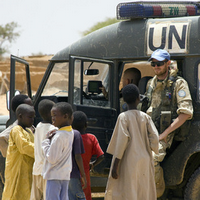When hundreds of thousands of Darfuri refugees flooded across the Chad-Sudan border in 2003, fleeing a campaign of ethnic cleansing orchestrated by the Sudanese government and its militia proxies, the U.N. and various aid groups raced to help. Humanitarian workers built a vast and sophisticated network of refugee camps to house as many as 300,000 people. The European Union and, later, the U.N. deployed peacekeepers to protect the camps. By 2008, the refugee camps in eastern Chad had become a self-contained society, one of the biggest and seemingly most permanent in all the world.
It was also a major reason why the Darfur conflict continued to rage five years after it had begun. Armed groups waging battle with Khartoum and its militias used the camps as safe havens and recruiting pools. Inadvertently, the U.N., EU and aid groups had taken a side in one of the world's worst conflicts, thereby prolonging it.
"Those camps do fuel conflict, no question about that," Marshall Wallace, director of the Massachusetts-based nonprofit Do No Harm project, told World Politics Review. "This is not uncommon. These camps get co-opted by warring parties."

